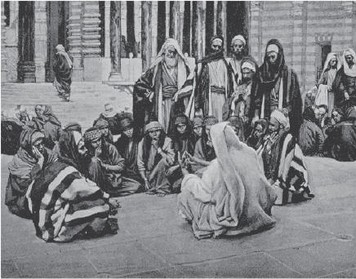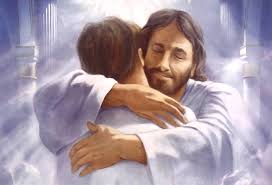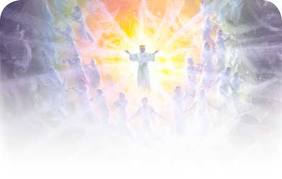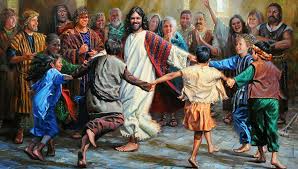
– 10th November 2019 –
Gospel Text : Luke 20:27-38
 vs.27 Some Sadducees – those who say that there is no resurrection – approached Jesus and they put this question to him,
vs.27 Some Sadducees – those who say that there is no resurrection – approached Jesus and they put this question to him,
vs.28 “Master, we have it from Moses in writing, that if a man’s married brother dies childless, the man must marry the widow to raise up children for his brother.
vs.29 Well then, there were seven brothers. The first, having married a wife, died childless.
vs.30 The second
vs.31 and then the third married the widow. And the same with all seven, they died leaving no children.
vs.32 Finally the woman herself died.
vs.33 Now, at the resurrection, to which of them will she be wife since she has been married to all seven?”
vs.34 Jesus replied,
“The children of this world take wives and husbands,
vs.35 but those who are judged worthy of a place in the other world and in the resurrection from the dead do not marry
vs.36 because they can no longer die, for they are the same as the angels, and being children of the resurrection they are sons of God.
vs.37 And Moses himself implies that the dead rise again, in the passage about the bush where he calls the Lord the God of Abraham, the God of Isaac and the God of Jacob.
vs.38 Now he is God, not of the dead, but of the living; for to him all men are in fact alive.“
************************************************
We have four sets of homily notes to choose from.
Please scroll down the page to read them.
Michel DeVerteuil : Michel, a Trinidadian Holy Ghost Priest, Fmr director of the Centre of Biblical renewal .
Thomas O’Loughlin: Thomas is on the theology faculty of Nottingham University
Sean Goan:Sean studied scripture in Rome, Jerusalem and Chicago and teaches at Blackrock College and works now with Le Chéile Schools.
Donal Neary SJ: Donal is editor of The Sacred Heart Messenger
*******************************************************
Michel de Verteuil
Lectio Divina The Year of Luke
www.columba.ie
General Textual comments
The gospel passage for this Sunday is challenging for us who practice the lectio divina method of reading the Bible text in dialogue with personal experience. From the outset there are three problems we must deal with if the passage is to speak to our experience as it is intended to.
a) The general theme of the passage is resurrection from the dead, something we believe in faith but have not experienced. We must therefore take the same approach as we did with “salvation” in last week’s passage; we start with partial and temporary “resurrections” we have experienced and allow them to become glimpses of the final and complete resurrection at the end of time. “Dying” will then refer to times when our world – or that of others – collapsed, and “resurrection” to times when we (or they) experienced new life in the wake of failure.
b) The passage refers to the Leviticus law in Deutoronomy 25:5, which is based on an understanding of marriage that is very different from ours. We Christians don’t see marriage in those terms at all. Our meditation will have to be very creative therefore, and we will probably find it impossible to use the word “marry” in praying the passage.
c) Some of the sayings in the passage are vague: “children of this world,” “children of the resurrection,” “they are like the angels,” “sons of God,” “to him all are alive.” In each case we must let the Word come alive by interpreting it in the light of our experience.
Through meditation, then, we will be led
– to celebrate “children of the resurrection,” including ourselves when we are at our best (thanksgiving),
– repent of our lack of faith in the resurrection, as individuals and as a Church (humility),
– pray that faith in the resurrection will triumph in us, in the Church and in the world (petition).
Textual Comments
The passage is in three sections.
1. Verse 27: Introduction
The introduction sets the scene – a meeting between Jesus and the Sadducees; we can identify with both.
 a) Jesus is in a specific historical situation. He is in Jerusalem, knowing that he is about to be arrested and condemned by the leaders of his own people and abandoned by his closest associates, but still self-possessed and trusting. In this encounter with the Sadducees he is not merely teaching, but bearing witness to his own faith in the resurrection. He “leads us in our faith and brings it to perfection” (Hebrews 12:2). In our meditation we celebrate him and those who have been his presence for us, challenging us by word and example to renew our faith in the resurrection.
a) Jesus is in a specific historical situation. He is in Jerusalem, knowing that he is about to be arrested and condemned by the leaders of his own people and abandoned by his closest associates, but still self-possessed and trusting. In this encounter with the Sadducees he is not merely teaching, but bearing witness to his own faith in the resurrection. He “leads us in our faith and brings it to perfection” (Hebrews 12:2). In our meditation we celebrate him and those who have been his presence for us, challenging us by word and example to renew our faith in the resurrection.
b) The Sadducees are ourselves to the extent that we “say that there is no resurrection,” not in words (since the resurrection is part of our Christian faith), but in practice. What this implies is explained below.
2. Verses 28 to 33: a case study
The Levitical law is far removed from our experience, so we have to be creative in interpreting it. Like all biblical laws, this was a life-giving Word of God. In the culture of the time, however, it reinforced the lowly status of women. Women at that time found their identity in having children. A woman who had no husband – and therefore no children – was nobody. Her inferior status is summed up in the Sadducees’ question “To which of them will she be wife?” which can be interpreted as “She has no husband, so who will she be?”
This approach is typical of people who “say there is no resurrection.” We fall into that category when we define people by their achievements – jobs, bank accounts, popularity, prestige, fame. We look scornfully at those who have none of these things – or lose them by “dying”. Like the Sadducees asking “To which of them will she be wife?” we ask the poor and vulnerable, those who are old or sickly or who have experienced failure, “Who are your friends? What have you produced?” Many still look on women as the Sadducees did; they ask, “Whose wife is she?”
In setting priorities for ourselves we “say there is no resurrection” when we get involved in projects not because they are good in themselves but because they bring us “outer’ benefits such as making money and attaining high positions, or “inner” benefits like feeling good about ourselves, feeling superior to others or having a sense of achievement.
The problem in each case is that we allow ourselves to be defined by these accomplishments. If we were to lose them (“die”), we would have to ask, “Who am I?”

We do this also as communities: the Church and its organizations and religious orders “say there is no resurrection” when they become fixated on achievements – attracting large numbers, attaining moral perfection, and so forth. Suppose we became “a little flock” again, we would be asking ourselves, “Are we really the Church?”
The capitalist system with its emphasis on productivity and consumption “says that there is no resurrection.” Nations too can seek their identity in military or economic victories, saying “What makes us a great nation is that we are No. 1.”
3. Verses 34 to 38: three wisdom sayings
Jesus answers the Sadducees’ – and our – question with three wisdom sayings intended to evoke the response, “How true!” and “How wonderful!”
a) Verses 34 to 36.
Jesus distinguishes between “children of this world” and “children of the resurrection” (there is a bit of both in each of us). “Children of this world” focus on achievements. “Taking wives and husbands” does not refer primarily to marriage (and not at all to Christian marriage). It means getting involved in projects in such a way that they define us. We do that when
– we sacrifice important values to attain high positions for ourselves and our families;
– we scheme and connive to prove ourselves better than others;
– we make “being perfect” the goal of our spiritual life so that when we fall into sin we become “nobodies”.
To the question “Whose wife will she be?” Jesus replies, “She was never just ‘somebody’s wife’; she was a person in her own right! So what if all her husbands died. She is still who she is.” This is the attitude of “children of the resurrection,” those who are “judged worthy of a place in the other world.”
Here again “they do not marry” does not refer to marriage as we understand it. It means, like Jesus himself, not allowing one’s identity to be determined by achievements. We can imagine Jesus saying to the Sadducees: “I too committed myself to many people (the leaders of the people, the Pharisees, Judas) and I have little to show for it. You think I am a failure, but I don’t see myself that way at all.” He told the apostles the same thing on the night before he died: “You will all run away, leaving me alone; but I am not alone because the Father is with me” (John 16:32).
 We think of the great men and women of our time who give themselves to noble causes such as non-violence, harmony between religions, liberation of oppressed people, equality for women. Often they are not praised, are condemned even, but continue to live fulfilled and productive lives. They are “children of the resurrection,” they “cannot die,” they are “sons and daughters of God.”
We think of the great men and women of our time who give themselves to noble causes such as non-violence, harmony between religions, liberation of oppressed people, equality for women. Often they are not praised, are condemned even, but continue to live fulfilled and productive lives. They are “children of the resurrection,” they “cannot die,” they are “sons and daughters of God.”
We think too of “children of the resurrection” who give themselves to the service of others:
– parents who walk with children who are mentally challenged
– friends who continue to care for delinquents
– political leaders who renounce power rather than compromise principles.
They often do not see tangible results, their sacrifices seem useless and “die”. But they maintain their dignity, their sense of self worth, their sense of humour even – they “cannot die”. If we ask them, “Who are you?” they will answer like Jesus, “I am a son or daughter of God.” Like Jesus they teach us to understand what it means to be “the same as the angels.”
b) Verses 37 and 38a
Jesus further clarifies his teaching on resurrection by inviting the Sadducees (and us) to enter into Moses’ experience in “the passage about the bush”. This refers to moments when we sense the greatness of people who have touched our lives (“ancestors” in the widest sense). They died, failed, or did not receive due recognition but continued to “live”. They could do this because they were “alive to God.” We may be dead in the eyes of our fellow human beings, but if we are true to the best of ourselves, we are alive in the eyes of God. The passage reminds us that faith in God is what gives us human beings the power to transcend failure and humiliation.
c) Verse 38b widens the scope of the teaching. Not merely our “ancestors” (in the wide sense as above) but all men and women have within them the seed of immortality, the potential to be truly great, “alive to God.”
We celebrate moments when some “Jesus” helped us – by word and example – to understand these things.
Prayer Reflection
“This great disaster is a symbol to us to remember all the big things of life and forget the small things of which we have thought too much.” …Jawaharlal Nehru, speaking to the Indian people on the night Gandhi was assassinated
Lord, we worry so much about what will happen to what we have worked for:
– will our children put into practice what we have taught them?
– will the community project we started survive?
– will we remain in good health?
– will our political party win at the polls?
We are like the Sadducees who say there is no resurrection.
But now and then you send us Jesus
to remind us that the only really important thing in life
is to be judged worthy in your sight,
and then we are truly children of the resurrection and we cannot die.
“Raise me up Lord, until at long last it becomes possible for me in perfect chastity to embrace the universe.“ …Teilhard de Chardin
Lord, free us from petty concerns,
that the whole world may be alive to us as it is to you.
“The fulfillment of our destiny is to find in God all our individual and personal reality.“
…Thomas Merton
Lord, forgive us for accepting the notion that we fail as human beings
when we are not productive:
– we make parents feel inferior because they have no children,
or because their children are not successful at school or in the work place;
– we are envious of fellow professionals who have attained greater heights than us;
– we do not give full respect to the aged in our communities;
– we lose enthusiasm for what we are doing
because our worth is not recognized by others.
We are Sadducees who say there is no resurrection.
Give us the grace to approach Jesus and receive his word
challenging us to move from being children of this world
to becoming children of the resurrection, your sons and daughters.
“Is it worth it? Everything in life is worth it if the heart is not small.” …Leonardo Boff
Lord, we thank you for faithful people,
– those who remain faithful when their spouses are not;
– parishioners who are content to work for the community without acknowledgement;
– those who fight for a noble cause without success.
They often die childless,
but we know you judge them worthy of a place with you in the resurrection from the dead.
Lord, we thank you that, like Moses, we can call you the God of our ancestors,
from Africa, Asia, India, Europe, middle East, or the Caribbean.
Many of them didn’t have our faith,
things we hold dear were not important to them,
but they are alive to us, because they believed in you
and you are not the God of the dead but of the living.
“Human beings ought not to consider their chances of living or dying.
They ought only to consider on any given occasion whether they are doing right or wrong.” ..Socrates
We thank you, Lord, for sending us in every age men and women like Jesus,
who challenge us to be children of the resurrection,
to know that we cannot die once we are concerned to be alive to you.
“To the conquistadors, where there were no wonders there was nothing.” …V.S. Naipaul
Lord, we your Church ask your forgiveness
for the times we judged cultures by their wealth and military might,
forgetting that to you they were alive – they were all your your sons and daughters.
“The Church admits that she has greatly profited and still profits from the antagonisms of those who oppose her.” …Vatican II document on the Church in the Modern World.
Lord, we thank you for people who come to us as the Sadducees came to Jesus.
At first their objections seem foolish,
but then we find that they help us clarify what we believe in.
********************************************
Thomas O’Loughlin,
Liturgical Resources for Luke’s Year
www.columba.ie
Introduction to the Celebration

We gather here on Sundays because this is the ‘day of the resurrection’. We call ourselves the people of the resurrection and of new life. We proclaim the mystery of faith: ‘Christ has died, Christ is risen.’ But we often do not stop and think about what we mean by ‘resurrection’ and ‘rising from the dead’. These questions will echo through our celebration today.
Gospel Thoughts
This gospel section is found in all three synoptics, but the version in Luke is by far the most rounded and coherent. The situation is a dispute with those for whom the notion of ‘resurrection’ was ludicrous, and as such the object of curious questions. But Jesus refuses to get involved in such a materialistic imagining of God’s plan as their questions suggest, and rather asserts that God is the God of the living for all have life in him. This controversy, in turn, became for the church a commentary on its own faith in the resurrection as that which Jesus shares with his disciples. Since this section of Luke’s gospel has a natural termination at 20:40, it is a pity that the last two verses have been omitted in the lection for today.
Homily Notes
1. We bandy the word ‘resurrection’ about with gusto. No celebration of the Eucharist is complete without some use of the word, while we cheerfully say that ‘we shall rise with Christ,’ or use similar expressions with the ease that we use a phrase like ‘I’m popping out to the shops for some milk.’ The assumption is that the meaning of ‘resurrection’ is immediately obvious. Yet this is the exact opposite of the case.
2. First, the notion of resurrection is, in popular contexts, very often thought of as little more that some sort of resuscitation (a corpse being brought back to life), or that it is no more than a verbal variant on the quite widespread belief in the immortality of the soul as a natural quality of human (or indeed animal) existence, or indeed some even think it is just another term for some vague post mortem existence (e.g. ‘There is something beyond the grave’) or otherworldly place (e.g. the media expert who says ‘What the Vikings called Valhalla was called Heaven by the Christians who converted them’). These confusions are ‘where people are at’ and today’s gospel provides an opportunity to address them.
3. The term ‘resurrection’ (literally ‘standing up again‘) is itself but a label for a mystery that is beyond us but which we glimpse in our experience of the presence of the Christ still with us, but also in the glory of the Father. The ‘resurrection’ is not some miracle to be either proved or disproved as ‘having happened’ in the historical order, rather it is the attempt in our human, earth bound language to give expression to our conviction, shared with the very first disciples, that Jesus’s presence did not end on the cross, but continued in a new way within the creation, and that he showed this new way of being, this new existence at the ‘ right hand of the Father,‘ was also the destiny of all who became one with him. Resurrection is about both now and the future, and it is about transformation both now and in the future. But this transformation in Christ is only glimpsed in this life in shadows and images; perhaps the greatest of these shadows that expresses this transformation is the ritual of baptism, while one of the simplest is the word ‘resurrection’.
4. But because resurrection is a mystery, it is, of its very nature, very difficult to preach or communicate verbally. By far the best positive preaching of resurrection takes the form of our great actions of faith: baptism, the movement from darkness to light at vigil services, or in the presentation of the Eucharist as the encounter with the risen One now in his meal. Yet we cannot remain silent for we are also creatures of language and words, and words can clarify and refine our understandings and open up the mind to the realities beyond words. So what can we say in a few moments about resurrection?
5. One method is to use a series of simple statements in the form of ‘not that, but this’. Here are four such statements that may clarify key aspects of Christian belief from some of the counterfeits found in contemporary popular culture:
A. Resurrection is communal, not individual.
We become the new People of God, the emphasis is not on my escape from the grave.
B. Resurrection is transformation, not resuscitation.
We can so easily get lost in materialist questions about empty tombs and miracles, but this is to see resurrection as one more event in the historical order, rather than the beginning of a new possibility of existence in God whose nature and form are beyond our imaginings.
C. Resurrection is life in God, not ‘spiritual’ endurance.
 Our focus of interest is not on some’ soul’ that might survive death, or some ‘place of the dead’ in an ‘ otherworld‘ or’ afterlife’ – all of which are very commonly held religious beliefs but that we become part of the Body of Christ sharing in the life of God.
Our focus of interest is not on some’ soul’ that might survive death, or some ‘place of the dead’ in an ‘ otherworld‘ or’ afterlife’ – all of which are very commonly held religious beliefs but that we become part of the Body of Christ sharing in the life of God.
D. Resurrection is God’s gift, not some quality of the immortality of the soul.
In any average congregation there will be some people who are interested in the ‘paranormal’, in so-called ‘near death experiences,’ or in practices that claim to speak to the dead. Such people often simply assume that the abilities they claim are justified by the Christian belief in resurrection. But such claims for an existence after death – while not contradictory of the belief in resurrection – are wholly distinct from it. The new life is God’s gift in Jesus Christ – we share in his resurrection – not simply an individual human life force having its own continued existence.
*******************************************
Sean Goan
Let the Reader understand
www.Columba.ie
Gospel Notes
 There is no doubt that people have all kinds of questions about heaven and what it will be like. In today’s gospel that issue is touched upon when Jesus is asked a very specific question about heaven. The key to understanding this incident is to realise that the Sadducees, who put the question to Jesus, do not believe in an afterlife at all. They represent a small branch of Judaism that was dominated by the Temple priests. Unlike the Pharisees they rejected the idea of an afterlife and the resurrection of the dead. So they think that by posing the right question to Jesus they can show that these are foolish ideas. Jesus, in answering them, does not tell us anything about heaven as such, he simply shows that their reasoning is false because they have too narrow an idea of God. Thinking about heaven requires more than simply transferring what goes on down here to some heavenly sphere. Heaven is about union with God, life in its fullness, so whatever idea we have of it, it will still come up short.
There is no doubt that people have all kinds of questions about heaven and what it will be like. In today’s gospel that issue is touched upon when Jesus is asked a very specific question about heaven. The key to understanding this incident is to realise that the Sadducees, who put the question to Jesus, do not believe in an afterlife at all. They represent a small branch of Judaism that was dominated by the Temple priests. Unlike the Pharisees they rejected the idea of an afterlife and the resurrection of the dead. So they think that by posing the right question to Jesus they can show that these are foolish ideas. Jesus, in answering them, does not tell us anything about heaven as such, he simply shows that their reasoning is false because they have too narrow an idea of God. Thinking about heaven requires more than simply transferring what goes on down here to some heavenly sphere. Heaven is about union with God, life in its fullness, so whatever idea we have of it, it will still come up short.
Reflection
For many people it comes as a surprise to know that the idea of martyrdom, i.e. dying for one’s faith, is absent in most of the Old Testament. For a long period in Biblical history when there was no belief in an afterlife, to have to die for one’s faith was considered as evidence that God had failed you. Today’s readings show that belief in the resurrection radically changed the way people looked at life. It gave them a new hope that enabled them to live through dreadful hardships and persecutions. For the early church, faith in the resurrection of Jesus was the cornerstone of all their preaching and it was this that allowed a message of indestructible hope to reach many whose lives were filled with despair. As we move towards the end of the liturgical year, the readings invite us to think about the end. This is not an invitation to worry or be perplexed about what we don’t know — it is rather an invitation to hope and have confidence in God’s will for us.
**************************************************************
Donal Neary SJ
Church Reflections, Year C
www.messenger.ie/bookshop/
A New Breakthrough
The big question is what it will all be like? Jesus gives no details. We live in hope and die in hope. We are to be alive forever in the love of God. God keeps love safe. When life ceases, love stays.
God is God of life, the Gospel says; To him all are alive/ even the dead,
God breaks into life in a new way at our death. It happens in small ways every time we are transformed a bit – when we forgive, make peace, really help another, when we promise ourselves to someone or some cause, we are in resurrection mode. But the final one is a gift unlike any earthly gift.
We need to share this hope with each other. The peace you may have felt at the death of someone, the dream where the loved one was happy, the thanks you feel for another for ever – all brings hope even if their death is sudden or self inflicted or at a young age. As we place our candle at the altar for our loved ones in November, we are letting them go off into what death really is – our finding our way to the arms of God.
Words of Pope Francis – “Hope is not looking at a  half-full glass, which is simply optimism, which is a human attitude that depends on many things. Hope is a gift of Jesus, of His very self, His very name is hope. It is Christ in you, the hope for glory.
half-full glass, which is simply optimism, which is a human attitude that depends on many things. Hope is a gift of Jesus, of His very self, His very name is hope. It is Christ in you, the hope for glory.
This is the eternal hope, which is the root of our joy even in the losses of our lives.
Lord, give us this day a renewal of faith in eternal life.